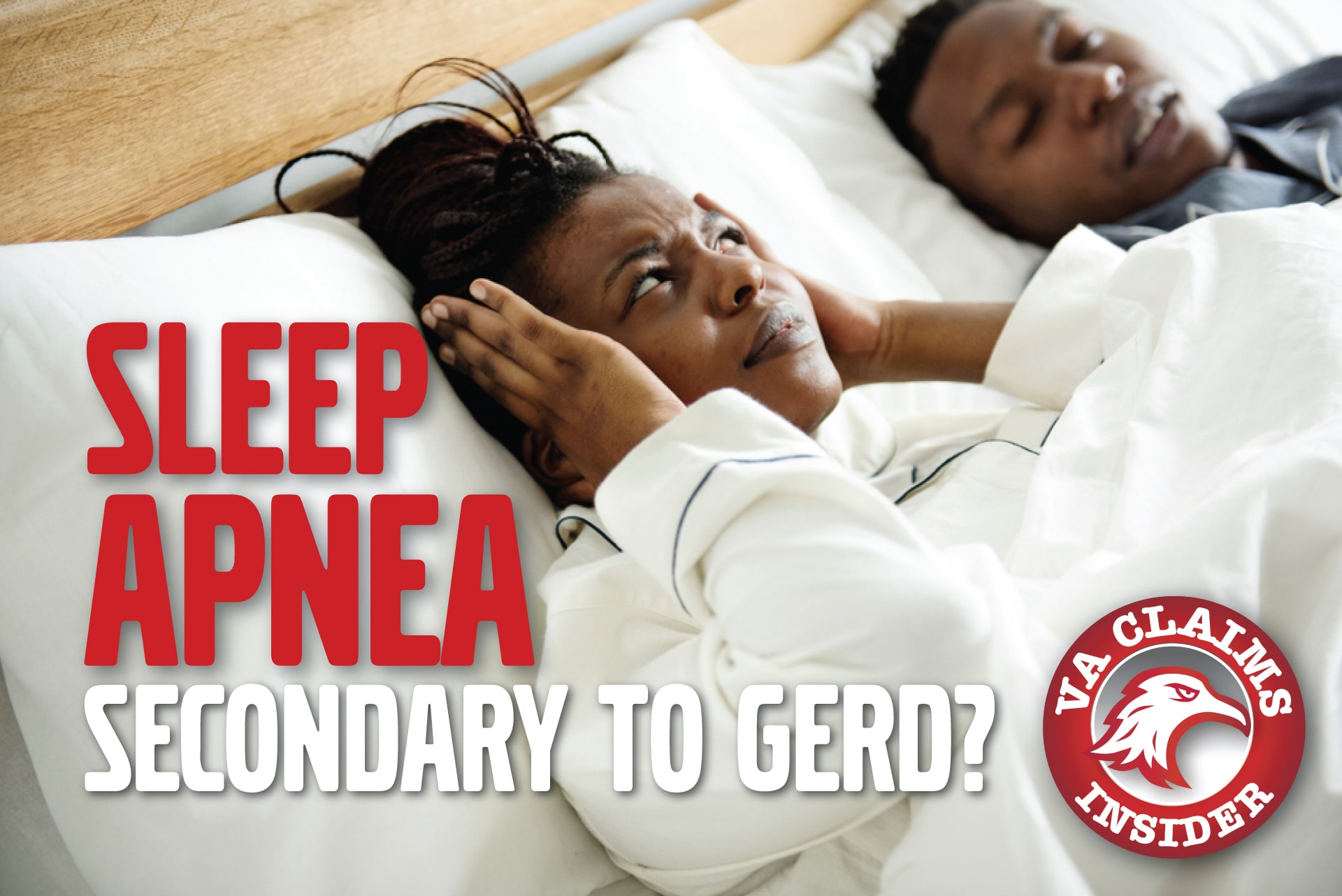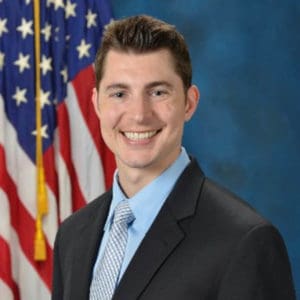Sleep Apnea Secondary to GERD – The Experts Guide

In this high-value post, I’m going to share some expert-level knowledge on how Veterans can service connect their VA claim for Sleep Apnea Secondary to GERD (Gastroesophageal Reflux Disease).
Did you know Veterans are nearly 4x as likely to have sleep apnea when compared to those who didn’t serve in the military?
The biggest problem, however, is that you probably weren’t diagnosed with sleep apnea while on active duty, which makes it more difficult to prove direct service connection years after leaving the military.
But, what about sleep apnea secondary to another service-connected disability, such as sleep apnea secondary to GERD?
- Sleep Apnea and Secondary Service Connection
- WATCH: Secondary Sleep Apnea VA Claims Explained Step-By-Step
- Sleep Apnea Secondary to GERD VA Disability
- Sleep Apnea and GERD – Are They Related?
- Research Study #1: GERD and Its Consequences on Quality of Sleep
- Research Study #2: The Linkage of GERD and Obstructive Sleep Apnea
- Favorable BVA Case Law Precedent Example #1:
- Favorable BVA Case Law Precedent Example #2:
- Need an Independent Medical Opinion (IMO) to help service-connect your VA sleep apnea claim?
- About the Author
Sleep Apnea and Secondary Service Connection
Okay, here’s the opinion of VA Claims Insider: If you did NOT have a sleep study while on active duty and you did NOT get a diagnosis of sleep apnea on active duty, you should attempt to service connect your sleep apnea VA claim secondary to another service-connected disability rated at 0 percent or higher.
Side note: You MUST have a medical diagnosis of sleep apnea and that must be confirmed by a sleep study (it’s okay if this diagnosis and sleep study occurred years AFTER leaving active duty).
You must first get a sleep study from a VA doctor or a private doctor
Why?
Because a sleep study is the only tried and true way of diagnosing sleep apnea.
WATCH: Secondary Sleep Apnea VA Claims Explained Step-By-Step
Here’s a secret tip: You can also order a sleep study at-home test kit if you don’t want to wait for the VA or private doctor (the downside is it could cost you a couple hundred dollars).
Okay, let’s explore how you can service connect sleep apnea secondary to GERD.
Sleep Apnea Secondary to GERD VA Disability
Service connection on a secondary basis requires a showing of causation.
A showing of causation requires that the secondary disability be shown to be “proximately due to,” or the result of, a service-connected disability.
By law, there are three evidentiary elements that must be satisfied for sleep apnea secondary to GERD to prove secondary service connection:
- A medical diagnosis of sleep apnea confirmed by a sleep study in VA medical records or private records (unless you did this already on active duty and it’s in your service treatment records)
- Evidence of a service-connected primary disability, which in this case would be Gastroesophageal Reflux Disease (GERD), AND
- Medical Nexus evidence establishing a connection between the service-connected disability and the current disability
The first part can be satisfied with any existing medical evidence in service treatment records, VA medical records, or any private medical records.
The second part can be satisfied with a veteran’s existing service-connected disability rated at 0 percent or higher, which would be GERD in this example.
The third part can be satisfied with a Medical Nexus Letter, aka, Independent Medical Opinion (IMO) from a qualified medical professional.
Did you know there are more than 50 conditions that can be medically linked to cause or aggravate sleep apnea?
Sleep Apnea and GERD – Are They Related?
Gastroesophageal Reflux Disease (GERD) happens when stomach acid flows back into the tube connecting your mouth and stomach (esophagus).
This backwash (acid reflux) can irritate the lining of your esophagus. GERD is mild acid reflux that occurs at least twice a week, or moderate to severe acid reflux that occurs at least once a week.
According to medical literature, GERD was a symptom associated with obstructive sleep apnea, and that GERD can mimic obstructive sleep apnea by producing a choking sensation and dyspnea.
Some researchers believe that the reflux of acids may result in spasms of the vocal cords that can then lead to sleep apnea.
The risks for GERD are similar to those for obstructive sleep apnea, and obesity is one reason people develop GERD.
Obstructive sleep apnea is also more common after middle age, especially in obese people. GERD and OSA can be highly associated – Click HERE to read more.
Research Study #1: GERD and Its Consequences on Quality of Sleep
Conclusion: During sleep, a case of reflux may allow stomach contents to rise as far as the back of the mouth. This is due to the (usually) horizontal position of sleeping. For those who experience reflux during sleep, this means rude awakenings with a sour, burning sensation in the back of the throat.
Source: https://www.sleepapnea.org/acid-reflux-gerd-sleep/
Research Study #2: The Linkage of GERD and Obstructive Sleep Apnea
Conclusion: Research shows that a relationship exists between obstructive sleep apnea (OSA) and GERD. One report suggests that around 60 percent of patients with OSA also experience GERD. Sometimes, obesity plays a third role in this relationship. When OSA occurs, changes in pressures within the diaphragm and the chest cavity make conditions favorable for acid reflux. It is also thought that an episode of apnea could alter digestive processes in a way that disrupts the function of the LES. Apneas also cause more “respiratory effort” during sleep. This might force a change in pressure in the esophagus that leads to an increased chance for reflux.
Source: https://www.sleepapnea.org/acid-reflux-gerd-sleep/
Favorable BVA Case Law Precedent Example #1:
Result: Service connection for obstructive sleep apnea, secondary to service-connected GERD, with history of esophagitis and hematemesis, is granted.
Source: https://www.va.gov/vetapp14/Files7/1454144.txt
Favorable BVA Case Law Precedent Example #2:
Result: The Board finds that the evidence supports the Veteran’s claim of entitlement to service connection for obstructive sleep apnea, secondary to his service-connected GERD, with history of esophagitis and hematemesis. The evidence shows a current diagnosis of “very severe obstructive sleep apnea.” The evidence also indicates that the Veteran’s service-connected GERD impacts on his ability to treat his sleep apnea with a CPAP machine. Finally, the Board finds the medical opinions of record addressing the issue of aggravation stand in equipoise in terms of their probative value.
Source: https://www.va.gov/vetapp14/Files7/1454144.txt
Need an Independent Medical Opinion (IMO) to help service-connect your VA sleep apnea claim?
VA Claims Insider ELITE is our premier program, which utilizes our proprietary medical process to identify gaps in your record to ensure (1) service-connection of your current disabilities, and (2) the highest rating possible under the law.
If you need a Medical Nexus Letter from a qualified doctor to service connect your VA sleep apnea claim secondary to another disability, click HERE now and complete our FREE 3-step intake.
==> Click HERE to apply and start FREE: www.vaclaimsinsiderelite.com <==
About the Author
Brian Reese is a VA disability expert, and founder of VA Claims Insider, “The Most Trusted Name in Education-Based Resources for Veterans.”

He is an Air Force service-disabled veteran, and his personal frustration with the VA claim process led him to found VA Claims Insider in 2016, which provides veterans with expert-level resources for successfully submitting your own winning VA disability claim.
He is also the CEO of Military Disability Made Easy, the world’s largest repository of VA disability claim information with linkages to specific medical conditions, which has served more than 4,600,000 veterans, VSOs, attorneys, medical professionals, and disability advocates since its founding in 2013.
His eBook, “The 9 Secret Strategies for Winning Your VA Disability Claim,” has been downloaded more than 300,000 times in the past three years and is the #1 rated free VA disability claims guide for veterans.
Brian is a former active duty Air Force officer with extensive experience leading hundreds of individuals and multi-functional teams in challenging international environments, including a combat tour to Afghanistan in 2011.
Brian is a Distinguished Graduate of Management from the United States Air Force Academy and holds an MBA from Oklahoma State University’s Spears School of Business, where he was a National Honor Scholar (Top 1% of Graduate School class).

